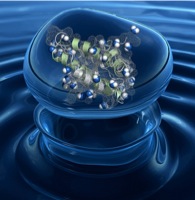Challenges of Water in Biological Systems
September 13-17, 2010
The workshop will take place in the 3rd floor conference room W301 of GCIS.
Topics for Discussion
-
•Bringing experiment, theory, and computation into greater consistency and harmony. Reconciling disparate time scales, improving models, achieving higher time resolution in experiments, including nonlinearities and nonlocal effects in models, improved representation of repulsive interactions
-
•The role of water molecules and hydration in protein dynamics, including folding and function; how does “slaving” control or respond to protein dynamics? what are the properties and functions of water at the surface of an “intrinsically disordered” protein? What roles do hydration shells play for structured proteins? For membranes?


Cover photo from PNAS March 9, 2004
G. A. Papoian et al. PNAS 2004; 101: 3352-3357

-
•The role of water in specific kinds of processes: what is the role of water molecules in proton transfer? What other molecules might substitute for water in specific functions? What is the role of internal water molecules in interacting with internal charges?
-
•The roles of hydrophobic and hydrophilic interactions: How is water driven out when two strands attach? What role do dehydrons play, and how is water driven from them? How do hydration shells affect protein interactions with other proteins and other molecules?
-
• The role of water molecules in interactions of proteins with other kinds of molecules, including small ligands, lipids, carbohydrates and others.
